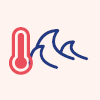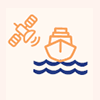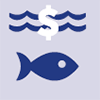The Commonwealth Blue Charter: Progress Report
An Ocean of Opportunity
The Commonwealth Blue Charter: Ocean Action Report
This progress report was released on 16 June 2022 by the Commonwealth Secretariat’s Oceans and Natural Resources Section, with notable contributions from David Sheppard, the Director of the Secretariat of the Pacific Regional Environment Programme (SPREP); Matthew Goldie-Scot, the Managing Director of the humanitarian strategic consultancy firm Thuso; and, Nina Schoonman, Consultant at Thuso. The purpose of this report is to illustrate the impact of the Commonwealth Blue Charter thus far under its 10 Action Plan Groups, and what will be its objectives and priorities moving forward.
Why is an ocean action agreement by the Commonwealth of Nations even necessary? Simply put, the world’s oceans are essential to billions’ livelihoods, yet increasing human activity jeopardises this precious resource at an almost-irreversible pace. No nation can tackle such dire challenges alone. For this reason, the Commonwealth, which covers approximately 36 per cent of the world’s ocean territory and 45 per cent of global coral reefs, has a unique and advantageous position to unite its nations and make a lasting positive impact. The Commonwealth has a strong presence (45 per cent of the entire association) of small island developing states (SIDS) that are amongst the most vulnerable to climate change due to which the Secretariat has been actively advocating for ocean sustainability through smaller initiatives before the bloc’s efforts were amalgamated into an express agreement in April 2018, the Commonwealth Blue Charter. The Commonwealth Blue Charter is an agreement between all 56 members of the Commonwealth of Nations to unite and collaborate on tackling ocean-related challenges and uphold their commitments to sustainable ocean action, especially under the United Nations Sustainable Development Goal (SDG) 14, “Life Below Water” to “conserve and sustainably use the oceans, seas and marine resources for sustainable development”. The main mechanism of the Charter comprises 10 Action Groups, each of which has a distinct but modular purpose to scale action, build partnerships, close funding gaps and train on-the-ground personnel on collective solutions. These 10 Action Groups are entirely driven by member-states, particularly 16 “Champion” states that have stepped forward to spearhead the programmes as listed below:
 Commonwealth Clean Ocean Alliance: Tackling marine plastic pollution
Commonwealth Clean Ocean Alliance: Tackling marine plastic pollution
Champion states: The United Kingdom and Vanuatu
 Coral Reef Protection and Restoration: Protection and revival of coral reef habitats
Coral Reef Protection and Restoration: Protection and revival of coral reef habitats
Champion states: Australia, Belize and Mauritius
 Mangrove Ecosystems and Livelihoods: Preservation and restoration of mangrove ecosystems and mangrove inclusive Ramsar sites
Mangrove Ecosystems and Livelihoods: Preservation and restoration of mangrove ecosystems and mangrove inclusive Ramsar sites
Champion state: Sri Lanka
 Marine Protected Areas: Commitment to the “Thirty by Thirty Target” to fully protect the 30% of global MPAs under Commonwealth Jurisdictions by 2030
Marine Protected Areas: Commitment to the “Thirty by Thirty Target” to fully protect the 30% of global MPAs under Commonwealth Jurisdictions by 2030
Champion states: Barbados and Seychelles
 Ocean Acidification: Improving knowledge and capacity to tackle increasing acidification and enacting legislation
Ocean Acidification: Improving knowledge and capacity to tackle increasing acidification and enacting legislation
Champion state: New Zealand
 Ocean and Climate Change: Incorporating ocean sustainability into Nationally Determined Contributions (NDCs)
Ocean and Climate Change: Incorporating ocean sustainability into Nationally Determined Contributions (NDCs)
Champion state: Fiji
 Ocean Observation Action Group: Deployment of Argo floats; disbursement of “GOA-ON in a box” observation kits
Ocean Observation Action Group: Deployment of Argo floats; disbursement of “GOA-ON in a box” observation kits
Champion state: Canada
 Sustainable Aquaculture: Good governance training and development of Strategic Roadmap on Sustainable Development of Aquaculture
Sustainable Aquaculture: Good governance training and development of Strategic Roadmap on Sustainable Development of Aquaculture
Champion state: Cyprus
 Sustainable Blue Economy: Implementing Marine Spatial Planning (MSP) initiatives and the goal to sustainably manage 100% of marine waters by 2025
Sustainable Blue Economy: Implementing Marine Spatial Planning (MSP) initiatives and the goal to sustainably manage 100% of marine waters by 2025
Champion states: Antigua and Barbuda and Kenya
 Sustainable Coastal Fisheries: National Plans of Action (NPOAs) to protect ocean life and implement the UN Food and Agriculture Organisation (FAO) Code of Conduct for Responsible Fishing
Sustainable Coastal Fisheries: National Plans of Action (NPOAs) to protect ocean life and implement the UN Food and Agriculture Organisation (FAO) Code of Conduct for Responsible Fishing
Champion states: Maldives and Kiribati
This newsletter is Part 2 of 2 of the Commonwealth Ocean Action Report Series. In case you missed Part 1, please click here.

Ocean and Climate Change
Achievements
Recently, the Ocean and Climate Change Action Group held a joint meeting with their Mangrove Ecosystems and Livelihoods counterpart to work together on devising ways to strengthen blue carbon ecosystems. The meeting revolved around finding solutions based on evidence from case studies of past successful blue carbon projects such as the mangrove restoration in the Gazi Bay of Kenya spearheaded by the local community in partnership with the United Kingdom-based charity, Plan Vivo, and the Scotland-based Association for Coastal Ecosystem Services (ACES). This project, titled Mikoko Pamoja, was drafted in 2010 and officially commenced on the ground in 2014 once the nation was alerted that almost 20 per cent of their mangrove forests were lost to timber harvesting; as of 2018, 117 hectares of mangrove forests are now under the protection of full-time guards and nearly 500 community members that continue to plant more mangroves at regular intervals. This project has prevented 9,880 tons of carbon dioxide emissions which translates to an equal amount of credits which were used to pay the community an approximate value of US$58,691. Based on such findings that community-led mangrove restoration is both viable and fruitful, the Action Group developed a briefing note that provides guidance on several ways that small and medium-sized ports could decrease their carbon emissions, supporting the International Maritime Organisation (IMO)’s target to cut down global carbon emissions by half by 2050.

Recently, the Ocean and Climate Change Action Group held a joint meeting with their Mangrove Ecosystems and Livelihoods counterpart to work together on devising ways to strengthen blue carbon ecosystems. The meeting revolved around finding solutions based on evidence from case studies of past successful blue carbon projects such as the mangrove restoration in the Gazi Bay of Kenya spearheaded by the local community in partnership with the United Kingdom-based charity, Plan Vivo, and the Scotland-based Association for Coastal Ecosystem Services (ACES). This project, titled Mikoko Pamoja, was drafted in 2010 and officially commenced on the ground in 2014 once the nation was alerted that almost 20 per cent of their mangrove forests were lost to timber harvesting; as of 2018, 117 hectares of mangrove forests are now under the protection of full-time guards and nearly 500 community members that continue to plant more mangroves at regular intervals. This project has prevented 9,880 tons of carbon dioxide emissions which translates to an equal amount of credits which were used to pay the community an approximate value of US$58,691. Based on such findings that community-led mangrove restoration is both viable and fruitful, the Action Group developed a briefing note that provides guidance on several ways that small and medium-sized ports could decrease their carbon emissions, supporting the International Maritime Organisation (IMO)’s target to cut down global carbon emissions by half by 2050. 7 Commonwealth nations, namely Fiji, Kiribati, Samoa, Solomon Islands, Tonga, Tuvalu and Vanuatu, along with the British Overseas Territory of Marshall Islands, have joined together to create the Pacific Blue Shipping Partnership which is a large-scale financial investment initiative aiming to reduce domestic shipping carbon emissions by 40 per cent by 2030, and if all goes according to estimated projections, shift to zero carbon emissions by 2050. Considering the alignment of the goals of the Pacific Blue Shipping Partnership with its own, the Action Group and its guidelines to reduce SME carbon emissions could significantly contribute to the group of Commonwealth nations’ ambitious targets.

Shifting the focus to individual member countries, Fiji is leading the Action Group’s campaign, both by example and by collaboration with other nations and supranational programmes. The Pacific country has brought 1.2 million sqkm of its ocean territory under official protection to preserve fishers, restore mangrove forests and seagrass fields, replant coral and gradually bring down shipping carbon emissions. Fiji and Australia supported each other in creating their own respective partnership models to identify their respective climate-related risks upon which they could build Climate Vulnerability Assessments (CVA). Fiji partnered with the World Bank, the European Union (EU), and the Global Facility for Disaster Reduction and Recovery to gather over 40 technical experts at the World Bank to draft a CVA, officially launched in November 2017 that aligned with the nation’s development goals. In 2008, the officials of the State of South Australia’s Climate Change Unit partnered with the local communities, creating 12 “regional committees” comprising local government leaders of the communities, to draft 12 CVAs to develop regional climate adaptation plans and a forum of local decision-makers to enable inclusive growth. These two examples of productive and successful partnerships on vulnerability assessment and mitigation strategy development are excellent blueprints for other member nations to follow to draft their own CVAs and mitigation plans.
Challenges

The unique task of the Ocean and Climate Change Action Group is to devise an Action Plan to design programmes and pilot projects for cross-cutting action across all Action Groups of the Commonwealth Blue Charter, with a special focus on projects for joint action on blue carbon. The challenge lies in the requirement of creating certified methodologies to be able to receive and/or sell carbon credits, also known as verified emission reductions (VERs) that are generated when a project successfully reduces greenhouse gas emissions. This is a challenge because such methodologies require several and frequent costly evaluations that are not viable for small-scale projects that may be the only kind that many nations, especially Commonwealth SIDS, have the capacity for right now. The Action Group is advised to amalgamate several streamlined blue carbon projects to save up on costs and it is recommended that they prioritise carbon sequestration for immediate positive impact across the Commonwealth. On a national level, carbon emission reduction can be integrated into national NDCs by leveraging green energy technologies, zero-emission fuels and energy-efficient shipping and port design that are promoted, regulated and swiftly implemented by robust climate action policy frameworks.

Finding pathways to integrate ocean action into national climate action plans is essential as global warming can not be reversed without proper and due consideration of the oceans. Unfortunately, many Commonwealth nations are focussing more on one than the other although both land and ocean climate action must be confronted in tandem. A good example of a Commonwealth nation doing so is Canada; according to the Commonwealth Ocean Action Survey, Canada’s climate plan dubbed “A Healthy Environment and a Healthy Economy” provides stipulations for the protection of ocean waters and marine ecosystems and is dedicated to bringing 25 and 30 per cent of Canada’s marine territory under protection by 2025 and 2030, respectively. This is an achievable benchmark that all Commonwealth nations are recommended to follow.
Next steps: Priorities and Opportunities

The reduction of greenhouse gas emissions is an overarching priority in the global effort to reverse global warming and ocean acidification. The Commonwealth Blue Charter Action Groups have a unique position in the global arena to lead in this regard due to their notably above-average skills in convening and lobbying with other international counterparts (e.g. the Alliance of Small Island States AOSIS).
Collective efforts to scale marine renewables and increase energy efficiency and capacity for both ocean and land action should be priorities as “no regrets” options i.e. policy options/ initiatives that generate net social/economic benefits regardless of whether or not climate change occurs. Furthermore, raising awareness of and scaling ocean action programmes already underway that are both reversing critical threats to ocean health as well as galvanising ocean resilience to the effects of climate change could create “triple wins” and are the ideal forms of use of climate funding. Restoration, conservation and protection for blue carbon resilience and elimination of marine pollution and resource exploitation are among a few “triple-win” initiatives that must be given top priority. Notwithstanding the fact that within the Commonwealth at least 40 coastal countries have blue carbon ecosystems that have the potential to absorb 5 times more carbon than tropical forests, they are degrading at a pace almost 10 times faster than the latter. Their rehabilitation must be an utmost priority for all nations; those without coastal territories can provide support and partake in rehabilitation efforts.

Currently, ongoing programmes including The Ocean Pathway, “Because The Ocean” and the SAMOA Pathways are notable models Commonwealth countries can utilise to integrate oceans-related climate change into their NDCs, national adaptation plans and other governmental climate and development policies and frameworks. These national initiatives, once they are in place and gaining traction, can be used to transition to region-wide ocean action through structures such as the Organisation for the Eastern Caribbean States (OECS) Ocean Policy Framework and the “Blue Pacific” Framework outlined by the heads of state of the Pacific nations. Spanning a wider international perspective, the Action Group has been advocating for ocean-related climate action, for example, accelerated emissions reductions, to be made a high-ranking priority in the UNFCCC process. Prior to the official start of the 26th UN Climate Change Conference of the Parties (COP26) as well as during it at the Commonwealth Pavilion, the Action Group and affiliated Commonwealth representatives hosted events underlining the critical need for financing to advance ocean resilience while also displaying practical examples and case studies from within the Commonwealth as pathways for stakeholders attending the Conference to takeaway from. The UNFCCC can also support mainstreaming ocean issues into international climate change regimes by enhancing the transparency and monitoring mechanisms of its financial instruments including the Special Climate Change Fund, Green Climate Fund, Adaptation Fund and the Least Developed Countries Fund. The Commonwealth Toolkit to Enhance Access to Climate Finance provides a comprehensive and practical set of guidelines and case studies to aid Commonwealth nations in availing of these funds.

The Ocean and Climate Change Action Group is acutely aware of the increasingly alarming issue of rising sea levels that are spilling over to and consequently shrinking the maritime boundaries of coastal nations. The Group has the potential to be a very capable and impactful forum to advocate urgent action to tackle the root causes of rising sea levels, especially if the current negotiations on the legally binding instrument on “Biodiversity Beyond National Jurisdictions (BBNJ)”, also known as the High Seas Treaty aimed at protecting marine biodiversity in areas beyond national jurisdictions (about 40 per cent of our planet’s surface), are successful. Lastly, it is also recommended that the Pacific Island nations, the most proactive states in the fight against ocean-related climate change, should team up with the Caribbean SIDS and strengthen their regional linkages to combine their platforms and echo each other upon the world stage to maximise their reach and further conjoined agendas to rouse global support.

Ocean Observation
Achievements

The Ocean Observation Action Group has made notable progress in enhancing ocean observational technologies, especially in the more remote and underrepresented territories. According to the Commonwealth Ocean Action Survey, 45 per cent of survey-participating countries have taken significant steps towards developing their research facilities and scientific knowledge pertaining to ocean observation systems. A notable example is Australia’s Integrated Marine Observing System (IMOS), a collaborative programme integrated into a nationwide monitoring system; it deploys monitoring equipment across the country’s coastal marine environment and collects and mines data on several physical, chemical and biological variables. Such breakthroughs notwithstanding, the Action Group has flagged the problem of inequitable distribution of observational technologies particularly in Commonwealth SIDS and coastal nations that are most vulnerable to marine climate change. To overcome this gap, the Action Group is working on mainstreaming affordable technology programmes like the Global Ocean Acidification – Observing Network (GOA-ON) in a box and Argo and its “Biogeochemical Argo” floats which can also be used to create low-cost and low-maintenance draw-down technologies as many nations grapple with limited resources and lack of financial access. A priority should be given to designing affordable eutrophication monitoring which could also greatly benefit other Action Groups including Ocean Acidification, Fisheries Management and Mangrove Ecosystems.

Highlighting the gaps in technical training and accessibility to tools and comprehensive databases on ocean observation that many Commonwealth nations face, the Action Group held multiple virtual meetings with participants from 18 member countries to collect and provide more Argo Floats and a public open-source analysis package and tools on collections of oceanographic Argo float datasets. Canada, as the Champion state of this Action Group, has been actively aiding information access across the Commonwealth through workshops such as the North Atlantic Biogeochemical Carbon Pump Workshop that was held in December 2021as promised by the state during the G7 Climate and Ministers’ Meeting that took place in May of the same year. In 2022, Canada conducted training on how to use the data science programme “R” Studio to process data collected by Argo Floats.
In conjunction with funding mobilisation and training sessions conducted in Commonwealth countries, the Action Group has been working with key political stakeholders to incorporate the ocean observational data and knowledge thus far collected into policy frameworks and Commonwealth product and services trade. Moreover, the Group has been proactively advocating for inclusivity in ocean science research and guaranteeing that gender studies and issues are also integral to the data collection process. An issue paper on gender issues in ocean science offering strategies and recommended actions on advancing gender equality in the field was published in December 2020 and in the same month it was presented during the All-Champions Virtual Meeting held as part of the International Women’s Day event “Sea the She: Recognising women’s contributions to ocean science”.
Challenges
Four main challenges have been identified in the Ocean Observation Action Group’s analyses as discussed during their meetings with coastal member nations. These broad categories of challenges include accessibility of ocean observation data; inadequate expertise and capacity to translate raw data into actionable knowledge; communication of the information to non-scientists and key decision-making leaders to be incorporated into national agendas; and, affordability of ocean observation equipment and the challenge of developing sustainable and long-term ocean monitoring.
Existing databases on ocean observation are still neither accessible nor actionable by many Commonwealth nations. A further complication is the lack of communication and data sharing between countries and initiatives. The Action Group is working tirelessly to encourage Commonwealth nations to share data and information across member nations and programmes while also finding pathways to increase data accessibility. While programmes like Argo are freely available to the public the second challenge previously mentioned, the restricted capacity to process and analyse raw data remains a large obstacle. The Action Group is currently seeking opportunities to develop data analysis software and provide training workshops where possible.
Policymakers and key decision-makers are becoming increasingly involved in raising awareness of the importance of ocean observation as a means to tackle global climate change and while much work remains to raise awareness in the general masses, the Action group is determined to bridge the gap between expert researchers and the global community in a meaningful manner which will lead to effective evidence-based climate change reversal action. Of all challenges pertaining to ocean observation, the difficulty of finding adequate financing to procure the necessary equipment and skills as well as the question of making sure these instruments and techniques are long-term and sustainable remains the biggest of all. While funding for short-term initiatives is readily available, they are not a permanent solution and what is critically needed for effective observation is monitoring and data mining over lengthy periods of time. The Ocean Observation Action Group is committed to working together with other Action Groups of the Blue Charter and relevant organisations to collaborate on developing affordable and maintainable long-term ocean monitoring projects.
Next steps: Priorities and Opportunities

In January 2021, the United Nations declared the start of the UN Decade of Ocean Science for Sustainable Development (2021-2030) in an effort to reverse the decline in global ocean health and gather all ocean stakeholders to collectively pen a common framework for the sustainable use and protection of the World Ocean. In support of this and the UN Sustainable Development Goal (UNSDG) #14: Life Below Water, the Ocean Observation Action Group is devising a plan of Action to engineer modular and portable/fit-for-purpose platforms to assess draw-down technologies necessary to produce cheaper ocean observation equipment with easy-to-understand interfaces. Accessibility of these tools along with the required knowledge, expertise and best practices needed to maximise their functions is an utmost priority for the Group which it aims to deliver through training sessions, publicly available libraries of datasets and supportive haptic tools that can visualise the collected data, including orphaned and other such data with missing context.
The intra-Commonwealth exchange of knowledge and data is pertinent to the equitable distribution of the necessary know-how to access and use observational technologies for the betterment of ocean health monitoring. To this end, the Action Group will continue to invite political co-operation in brainstorming pathways which incorporate ocean observational knowledge into policies and goods and services trade. Feedback and recommendations from other Action Groups will be integrated into discussions on cross-cutting issues wherever opportunities to collaborate arise. Lastly, the Action Group will further studies examining the role of youth, gender and Indigenous factors in ocean-related scientific research, provide them with a platform to forward the recommendations from gender equity issue papers and seek opportunities for Indigenous peoples and youth in the ocean sciences fields of research.

Sustainable Aquaculture
Achievements

Providing food for an increasing global population has become one of the most pressing issues faced by humankind. As one of the fastest-growing food production industries worldwide, aquaculture is crucial for global food security as well as for generating employment and opportunities to improve the well-being of the local communities of coastal countries. Many Commonwealth countries such as India, Bangladesh, Australia and Sri Lanka have comparatively modern and mature aquaculture industries and can play a significant role in calling upon fellow coastal nations to enhance their aquacultures via methods such as the selective farming of species that feed low in the aquatic food chain, sustainable intensification and certification, ecological aquaculture and integrated multi-trophic aquaculture among others.
3 Commonwealth nations have stood out in their contributions to the Action Group because they have made aquaculture a critical priority in their respective National Adaptation Plan of Action (NAPA). These three countries include The Gambia which has vowed to increase fish production sustainably to prevent endangerment of any marine species; Bangladesh which is adapting methods to new climate-induced environments such as increasing salinity; and Zambia, which is using spatial planning of land use practices aiming to improve marine resource usage.

Several case studies have been, and are still being, conducted by the Commonwealth Blue Charter in both Commonwealth and non-Commonwealth countries to understand and assess areas of development to be worked on to galvanise their blue economy and create guidelines and key learnings for other Commonwealth nations to follow. In Seychelles, there is renewed vigour to establish a strong mariculture sector via the nation’s Blue Economy Strategic Framework and Roadmap which was officially launched in 2018. The Seychelles Fishing Authority (SFA) has been working for over a decade to conduct background research on how to improve aquaculture production, specifically of marine finfish and invertebrates such as snappers, groupers, sea urchins and sea cucumbers, in compliance with the United Nations Food and Agricultural Organization (FAO) Ecosystem Approach to Aquaculture. Vital infrastructure has been built to include broodstock acclimation and quarantine facilities, a sea urchin research facility and a pilot-scale cage aquaculture site with other projects and research centres also in the pipelines. Simultaneously, aquaculture regulations are being drafted for gazetting and public education and awareness campaigns are also underway.
Another ongoing case study is taking place in Cyprus where the performance of marine offshore aquaculture is being assessed and a legislative framework for the provision of a secure investment environment for developing the aquaculture sector in a sustainable manner was recently established. This legal framework and the establishment of a mandatory environmental monitoring programme have paved the way for real-time data on the nation’s footprint in the region’s aquaculture operations and are an extremely useful tool to understand and implement immediate corrective measures, including a “precautionary approach” system developed by the Department of Fisheries and Marine Research (DFMR) to only allow increased production in phases to evaluate environmental impacts and make changes where needed to ensure resource sustainability. Over the past decade, Cyprus has moved aquaculture production units offshore at a depth of more than 40 metres to reverse the degradation in the shallower waters.
An example of a completed case study by the Blue Charter pertains to the management practice training for Egyptian fish farmers. In 2011, the Swiss Agency for Cooperation and Development (SDC) conducted a study which identified potential solutions to the outdated farming methods being used in the country’s fish farming zones. The SDC subsequently funded a three-year project officially titled: “Improving Employment and Income through the Development of Egypt’s Aquaculture Sector” which was undertaken by the research institute, World Fish. Since its start in early 2012, 2,400 fish farmers have been trained in best management practice (BMP) by locally based trainers, resulting in high adoption rates of the training, which consequently improved feed efficiency and increased average profits by US$16,000 per farm. Based on these calculations, the project has added a total value of US$27 million to Egypt’s Aquaculture sector.
Challenges

Within the Commonwealth, the fish farming sector remains restricted to a subsistence role and faces many difficulties in achieving economies of scale. The lack of expansion is largely due to poor infrastructure in rural areas where population density, crucial information and awareness of the need for sustainability and training on modern and sustainable methods are minimal. Small and fragmented markets in coastal areas are not well connected to major trading hubs and the lack of affordable credit compounds the obstacles for farmers looking to grow their businesses. Aside from these apparent hindrances, the Commonwealth Ocean Action Survey results also highlight the issue of weak legislative frameworks governing the fish farming sectors of Commonwealth coastal nations which require swift and critical updates to adapt to the changing domestic and environmental needs.
Before these issues are addressed, the Commonwealth countries must also acknowledge the fact that aquaculture, the way it is largely practised today, by itself imposes negative effects on the global marine environment. Not only are current practices not sustainable nor mindful of the risks of overfishing that could lead to the extinction of marine species, but the over usage of antibiotics has over time increased antimicrobial resistance in the endemic and exotic infectious diseases that target farmed aquatic species rather than inhibit them. Certification and schemes aimed at promoting sustainability standards and reviving consumer confidence have proven to confuse rather than aid small-scale farmers who, due to a lack of clarity on regulations and the rationale behind them, have resisted compliance. New and improved regulations and standards must consider individual policies and aquacultural projects in the broader context of a sustainable Blue Economy strategy and/or national ocean policy and must adapt to the understanding and capacity levels of the small-scale rural farming communities. In regards to the conundrum of emerging diseases and biosecurity, careful planning, plentiful resources, growing initiative amongst political decision-makers and coordinated international action will be necessary to tackle this growing problem. Failure to address such issues in time will leave the aquaculture sector in every country extremely vulnerable and evolving diseases pose a significant threat to the well-being of marine species and human consumers.
Next Steps: Priorities and Opportunities

Drafting and launching a Strategic Roadmap for Sustainable Aquaculture is the key priority for the Sustainable Aquaculture Action Group. Through the Roadmap, the Action Group will have a unique and important position to recommend necessary changes and initiatives to key stakeholders and policymakers. It will also provide the Action group with a platform to raise awareness amongst stakeholders and civil society on the crucial role of aquaculture in national economic and environmental targets, in national food security and nutritional needs, in implementing legal frameworks protecting marine biodiversity and endangered species, and in fulfilling NDCs and NAPAs. In tandem, Action Group member states will be developing project proposals in partnership with other external organisations to train local fisherfolk in sustainable fish farming methods and to secure funding for nations that need capital for capacity building, for e.g. the government of Antigua and Barbuda is seeking support to increase its food security via fish farming.
Producer organisations (POs) created by communities of fisherfolk could help establish gradually increasing economies of scale necessary for purchasing affordable equipment and inputs needed to develop the capacity to serve larger markets with competitive pricing. Such organisations may also be extra effective and swift in distributing profitable best farming practices; for example, the Pacific Community (SPC), formerly known as the South Pacific Commission, is a very good example of an effective regional PO that has been proactively disbursing best practice guidelines, raising awareness through campaigns and physical/virtual conferences and seminars, and creating a database of grants and fundings for fisherfolk, businesses and stakeholders to use to improve capacity and infrastructure. POs, whether national or regional, must ensure their aquaculture production meets the sanitary and phytosanitary standards promulgated by the World Trade Organisation (WTO) and Codex Alimentarius.

Synergy between the Sustainable Aquaculture Action Group and its nine counterparts is absolutely essential. For instance, coastal mangroves and seagrass are crucial carbon sinks which is why collaboration between the Sustainable Aquaculture and Mangrove Ecosystems and Livelihoods will be required to ensure mangrove habitats and seagrass beds are not converted into fish farms or fishing docks. As for the fish farms that have already been established in mangrove and other biodiverse plant habitats, they must be encouraged and given the training to reforest their local areas to make up for the habitat loss; the German Association for Organic Aquaculture, Naturland, for example, provides “organic aquaculture” certification to shrimp farms that reforest more than half of the mangrove land their farms have infringed upon within a period of 5 years which gives them access to more lucrative European markets. While reforestation is a good compensation for already established fish farms to provide, where possible, fish farming communities are advised to relocate away from mangrove areas to fully protect the biodiverse habitats and allow them the space to expand. Technology, especially geographic information systems (GIS)- based mapping, can provide innovative new ways to analyse risk-based zoning to assess ideal aquaculture sites using integrated environmental monitoring to assess water temperatures, toxin levels and harmful algal blooms etc. Low-cost early warning systems available as mobile technology applications, and the provision of credit and insurance can help support fisherfolk communities cope with and adjust to the risk of climate change-induced changes to their environment. The UN FAO’s Ecosystem Approach to Aquaculture also provides technologies such as recycling aquaculture systems (RAS) and aquaponics to support local communities in adapting to climate changes and in June 2022 the organisation conducted training over a span of two and a half days on good governance practices and follow-up rapid governance assessments are currently being drafted.

Sustainable Blue Economy
Achievements

24 Commonwealth nations currently have at least one marine spatial plan (MSP) programme, 20 thus far have launched their own “Blue Economy” initiatives and 18 have ongoing/planned national strategies for Blue Economy development, 5 of which have dedicated Blue Economy ministries. Commonwealth nations of the Action Group have also been active in global forums; 12 member nations have signed the Jakarta Declaration on Blue Economy that was officiated during the second Indian Ocean Rim Association (IORA) Ministerial Blue Economy Conference in May 2017 in Jakarta, vowing to implement the IORA Action Plan (2017-2021) to safeguard the Ocean’s health via sustainable resource extraction. Most notably, 7 Commonwealth nations, namely Australia, Canada, Fiji, Ghana, Jamaica, Kenya and Namibia, are members of the 17-nation High-level Panel for the Sustainable Ocean Economy initiative under which they have promised to develop sustainable management for 100% of their marine water territories.
During the second Sustainable Blue Economy Acton Group meeting, the Action Group presented its Terms of Reference (TOR) and Plan of Action (PoA) to Commonwealth member nations all of whom have had an opportunity to discuss the upcoming tasks and priorities of the Group for the coming decade. In November 2018, Kenya and Canada, in collaboration with Japan, co-hosted the Sustainable Blue Economy Conference (SBEC) in Nairobi; the meeting was attended by over 16,000 individuals which included 7 Heads of State, 84 ministers, governors, mayors and notable civil society representatives. By the end of the conference, several initiatives to develop sustainable marine commodity trade on a national, continental, as well as global level, were ratified. Another event organised by the Action Group was a webinar that took place in August 2020 called “The Blue View: Opportunities and Challenges for the Blue Economy” which included a panel discussion with the Commonwealth Secretariat Department of Oceans and Natural Resources, Kenya’s State Department of Fisheries, Aquaculture and Blue Economy, the Seychelles Conservation and Climate Adaptation Trust (SeyCCAT), the Nelson Mandela University and Seascape Consultants. Using key takeaways from these events as well as learnings made by its member states, the Action Group has released an educational video on the sustainability pillars of the global Blue Economy and several case studies for member states to utilise as guidelines, such as the “Innovative ‘Debt for Conservation Swap’ Conservation and Climate Adaptation Trust, and Blue Bond Plan” that was conducted in Seychelles. The Action Group continues to work on its series of technical working papers and recommendation notes, titled “The Commonwealth Blue Economy Series”, to support Commonwealth governments looking to develop their marine economies and recently also published an Advisory Note on “tracing Options for Marine Genetic Resources from within National Jurisdictions”.

As the Co-Champion state of the Action Group, Antigua and Barbuda is collaborating with the Association of the Commonwealth Universities (ACU) and the University of the West Indies to set up a Centre of Excellence in Oceanography and Blue Economy (COBE) at the University of the West Indies’ Five Islands Campus in Antigua and Barbuda. This new institution has been established to promote intellectual progress and strengthen the institutional capacity in the areas of marine science by harnessing the economic opportunities that the emerging blue economy sector in the Caribbean can provide. The International Steering Committee of the COBE, which comprises representatives from the ACU, the Commonwealth Secretariat, the Centre for Environment, Fisheries and Aquaculture Science (CEFAS), the Commonwealth Enterprise and Investment Council (CEWIC), The University of the West Indies (UWI) and the Antigua and Barbuda High Commission (London), visited the Centre in February 2022 and officially undertook a scoping mission to lay the foundations for it and vowed to meet monthly to develop the Centre’s mission and expand its operations. Furthermore, Antigua’s Department of the Blue Economy launched its Maritime Economy Plan (MEP) in March 2021 as a master plan to invite the nation’s stakeholders to focus on collectively improving the ocean-based economic sectors. The government of Antigua and Barbuda is also partnering with the United Nations Division of Ocean Affairs and Law of the Sea to compile all the laws, regulations and policies on the nation’s development of the ocean economy into one compact and official document as a coherent outline for policymakers to read with ease and execute systematically.
Challenges

Critical research for the development of integrated marine (spatial) planning and environmental analyses are both time-consuming and extremely resource intensive and with the dearth of technical expertise and constraints in capacity building, Commonwealth nations face dire challenges in their objectives to research and implement measures to adopt blue economy initiatives and advance their knowledge and sustainable use of marine resources. As many Commonwealth nations have insufficient capital and national financial resources, the Action Group is requesting support from development partners and international associates, particularly during the second virtual meeting it plans to host by the end of 2022.
However, even if the Action Group is successful in securing financial and technical resources, broader issues persist well beyond the developmental research and implementation stages. The lack of an extensive and transparent policy framework as a regulatory foundation for the Blue Economy and the obstacles in scaling marine spatial planning across jurisdictions, all while also juggling trade-offs between clashing activities and interests are all major questions that have yet to be confronted. To further explain the issue pertaining to conflicts of interest, countries’ marine environments often extend beyond nationally demarcated boundaries which means that blue economy activities in one nation may infringe upon the territory of another nation and since many ocean resources, such as migratory fish stocks and marine genetic resources (MGR), usually oscillate between several territories, it can create a politically and economically ambiguous situation that could put some nations at a disadvantage. For example, 20 of the 56 Commonwealth nations are not signatories of the UN Convention on the Law of the Seas (UNCLOS) and its implementation agreement for migratory fisheries stocks which could bar them from utilising marine resources that migrate outside their national jurisdictions.
To understand and work through shared regional environmental impacts it is pertinent for nations to cooperate and exchange environmental information with the support of competent and verified international institutions to oversee, substantiate and properly catalogue the information for convenient and public access.
Next Steps: Priorities and Opportunities

The Action Group is currently working on matching viable blue economy projects with funding and partnership opportunities with civil society organisations and other development partners of the Commonwealth Secretariat. The Secretariat is also working to expand the publicly available toolkits and guidelines for Commonwealth nations to develop their blue economies sustainably, including the aforementioned Commonwealth Blue Economy Series and the Commonwealth Blue Charter Blue Economy Toolkit.
Marine renewable energy is becoming increasingly important to meet the growing demand for energy across the globe and the sectors of marine tourism, marine transport (shipping, sea cables and pipelines) and marine bioeconomy will greatly support the future of sustainable trade and economic development. Along with these sectors, payments for ecosystem services (PES) which includes payment for the conservation and restoration of blue carbon sinks via the “carbon-market” approach, are also becoming increasingly relevant in the present day and age as the movement and call-to-action for economic and corporate action against climate change gains momentum. To support ocean resource management and robust measurement of the globally developing blue economy, niche skill sets, such as ocean accounting, marine archaeology, biodiversity training and marine big data analysis, will become increasingly necessary.
However, unprecedented initiatives entail unprecedented challenges. The blue carbon markets worldwide are still in their infancy as the conceptualisation of blue carbon remains incomplete. As such, it is near impossible to measure which is why it has not yet been included in emissions accounting or any international green standard. Furthermore, the Blue Economy as briefly touched upon in the previous section, has significant implications for ocean space access and distribution among nations and also poses the question of who will be the political stakeholders and decision makers behind the demarcation and supervision of marine boundaries. Due to the sensitivity of the issues, a careful, transparent, equitable and inclusive approach must be adopted by all parties when drafting rules, regulations and guidelines. Another development which will require extreme caution is the plan to exploit non-renewable resources found in the ocean via offshore petroleum and deep-sea mining. While these may present attractive short-term benefits, especially during the current period of vulnerable energy security, these sources will be detrimental to sustainable energy objectives in the long run and there is a further risk that the distribution of the exploited resources would not be equitable especially for small island developing states most vulnerable to the effects of climate change. Lessons must be learnt from the negative consequences witnessed in terrestrial mining and measures must be taken to prioritise the development of sustainable and renewable energy sources, including hydroelectric power production that could be harnessed from ocean bodies.

Sustainable Coastal Fisheries
Achievements

Every Commonwealth coastal nation has, at least once, reported its progress in implementing the FAO Code of Conduct for Responsible Fishing, though not all member nations have been equally as regular since. Additionally, 70 government officials from 16 Commonwealth nations have taken up introductory courses on the legal, policy and management elements of coastal fisheries regulation and have undergone coastal fisheries compliance training arranged by the UK-based not-for-profit organisation and leading agency in the sector of marine compliance agency, OceanMind.
The Sustainable Coastal Fisheries Action Group held its second meeting in May 2022 wherein its terms of reference (TOR) for its Plan of Action (PoA) were agreed upon and the fundamental and thematic areas of priority were agreed upon by all members to be implemented in the upcoming CHOGM cycle. The Action group’s Co-Champion, Kiribati, established the Kiribati National Task Force under the Action Group under which a key-learning sharing workshop was organised. Aside from the workshop, the Action Group has published multiple case studies for Commonwealth nations to learn coastal fisheries management best practices, including studies on community-based fisheries management in Kiribati, the Lyme Bay Fisheries and Conservation Reserve in the UK and the individual transferable quotas for cod fisheries in Iceland.
Challenges

Within the Commonwealth of Nations, some of the most frequently reported crimes include fishing without a valid license, fishing during closed season and fishing in prohibited zones. In Commonwealth nations such as Sierra Leone and The Gambia, upto almost 60 per cent of their legal violations revolved around illegal and unreported large offshore vehicle incursions in coastal areas; such violations are in fact underreported and smuggling and human rights and labour abuse are also widespread. While the Action Group is making proactive efforts to tackle these issues, financial and capacity constraints and bureaucratic hurdles in developing relevant projects and initiative proposals have staggered progress and further support is needed.
Results of the Commonwealth Ocean Actions Survey reveal the immense difficulty member states and relevant Commonwealth organisations and their associates face in collecting data on coastal fisheries, especially in small island developing states (SIDS) like Kiribati and Nauru. Many of these countries use a single-species approach for stock assessment as a means to measure the impact of their fishing on the abundance of the fish stock of the particular species. While this method is more feasible and less resource-intensive, it is time-consuming. It more often than not fails to compute into its calculations the intricate interactions within the trophic ecosystem. It is critical for current systems of assessment to be revamped to include an ecosystem approach for coastal fisheries management.
Both the challenges of overexploitation and mismanagement are further exacerbated by the rapidly increasing adverse effects of climate change. Experts predict that climate change could soon jeopardise the aquacultural productivity of fisheries by causing changes to the distribution of commercially important species which may run the risk of completely driving them out of the coastal jurisdictions where they are currently being managed. This is especially dire for small-scale coastal fisheries, countries that rely the most on coastal resources for their well-being and are most vulnerable to the effects of climate change. Many Commonwealth nations fall under these three categories and without planning and proactive regional coordination on surveillance of species distribution and sharing of critical knowledge and technical expertise with the disadvantaged member nations on how to sustain their resources, severe repercussions could arise including total loss of fishing stocks.
Next Steps: Priorities and Opportunities

The Action Group is keen to draft and release its Plan of Action. It has already been agreed upon that the PoA will focus on action pathways to build capacity and amplify the tangible and measurable impact of coastal sustainability initiatives and programmes. These pathways will address core issues in fisheries management; fisheries laws and policies; data collection and transparency in scientific procedures (which are encouraged to be made publicly accessible); monitoring, control and surveillance (MCS); harmful fisheries subsidies; and, enforcement of sanctions and penalties for illegal “pirate” fishing. In support of the Action Group, the Commonwealth Secretariat is preparing virtual training sessions on effective coastal fisheries policy enforcement and supervision.

Studies have found a strong correlation between poor governance and illegal, unreported and unregulated (IUU) fishing. The risk is higher in developing countries that are dependent on marine resources for their livelihood and economic development because as fish stocks gradually decline, fisher communities procure more fish and expand their spatial trawling range into nearby territories which consequently leads to overcapacity. Overcapacity refers to an excess of fishing vessels’ harvesting power which results in redundant fishing inputs and over-procurement of valuable and finite fish stocks. Since 1995, the production and usage of fishing vessels have tripled which is why the UN SDG 14.6 specifically calls for harmful subsidies on overcapacity to be eliminated as soon as possible; the WTO also plans to cease capacity-building subsidies for unsustainable fisheries that fail to meet compliance standards and endeavours to discuss the cancellation of fishing vessel fuel subsidies as well.

Aside from the issue of overcapacity, misuse of ocean resources due to by-catch and post-harvest losses are also extremely detrimental and a matter of urgency. While it is most advisable to exercise caution when fishing so as to prevent harvest-loss waste and by-catching, in situations where it is inevitable it is recommended that the by-products be converted into fishmeal. Fishmeal production constitutes 16 per cent of the global fishing industry and conversion of food-grade harvests, though not ideal, is a much better option than food wastage. Post-harvest losses can also be minimised by diverting capacity-enhancing subsidies into improving cold chain logistics, the quality of existing storage facilities and systems and market access. Globally, only 22 nations have thus far incorporated preventive measures against by-catch harvesting of sharks, seabirds and turtles in their National Plans of Action (NPoAs); Commonwealth nations can learn from such policy frameworks and use them as guidance to adopt similar NPoA clauses and where possible, also add other vulnerable species into their list of protected marine animals. Binding policies must be promulgated with effective and swift penalty systems in place for violations.
Shared characteristics including a limited resource pool, heavy reliance on the blue economy for livelihoods and economic development and a comparatively higher vulnerability to the adverse effects of climate change are all uniting factors for the Pacific islands which have been the impetus for greater unity in the regional fight against unsustainable fishing practices. An example of impactful cooperation in managing shared fisheries is the Nauru Agreement which was promulgated in 1982 and consists of 6 Pacific states and two associated territories, all of which are part of the Commonwealth. The Agreement was established to protect the region’s tuna stocks which comprise one-fourth of global supplies of the product due to which it is one of the top revenue-generating commodities for the Pacific island nations. Other Commonwealth nations must take the example of such collaborative agreements and recreate their own adaptations befitting the context of the environmental requirements of their respective regions.
A Blue Post-Pandemic Recovery
With the onset of the global COVID-19 pandemic in late 2019/early 2020, resources and funds from all possible avenues were channelled into immediate crisis management, health and economic responses and many ongoing initiatives of the Blue Charter Action groups were consequently put on hold. While this has caused significant delays in the Blue Charter Groups’ PoAs and related initiatives, the post-pandemic recovery period presents a unique opportunity for the integration of Action Group objectives into the global endeavour to “build back better” especially considering the accelerated digital breakthroughs that were achieved during the international lockdown. The Secretary-General of the Commonwealth Secretariat, the Hon. Patricia Scotland KC, stressed the need to “lock in ocean sustainability” and recognise the importance of a “Blue Reset” in building resilience and equitable resource distributions into national and regional marine economic development. During the virtual World Ocean Day 2021, participants discussed the potential benefits of financial tools in expediting existing efforts to integrate Blue Charter’s projects into the national agendas of Commonwealth nations which can eventually amalgamate into regional and international collaborative “Blue Recovery” strategies.
Conclusion: Building Momentum and Making Waves
In the span of four years, the Commonwealth Blue Charter has made waves creating a proactive, far-reaching and dynamic network of knowledge-sharing, skills and data analysis training, awareness and idea-sharing to motivate and support Commonwealth nations. The Champion states of the Action Groups have showcased impressive observable progress through their own respective initiatives as well as through synergistic projects and cross-cutting themes. The unique strength of the Blue Charter lies in its ability to support and facilitate regional cooperation which will be harnessed to explore new partnerships and navigate innovative pathways to further galvanise its momentum. This could include potential synergies with the new Commonwealth Living Lands Charter, its terra counterpart, to introduce a more holistic and long-lasting approach to sustainability on both land and sea.
The Commonwealth Blue Charter will continue to mobilise members of the Commonwealth and the nations of the world to deliver a common future that honours the planet and commits to sustainable, equitable and mutually beneficial resource usage. The announcement of the Blue Charter Project Incubator during CHOGM’22 and the ongoing discussion on the establishment of an Action Fund under the Blue Charter showcase its effectiveness and the trust of stakeholders it has gained and will continue to uphold.